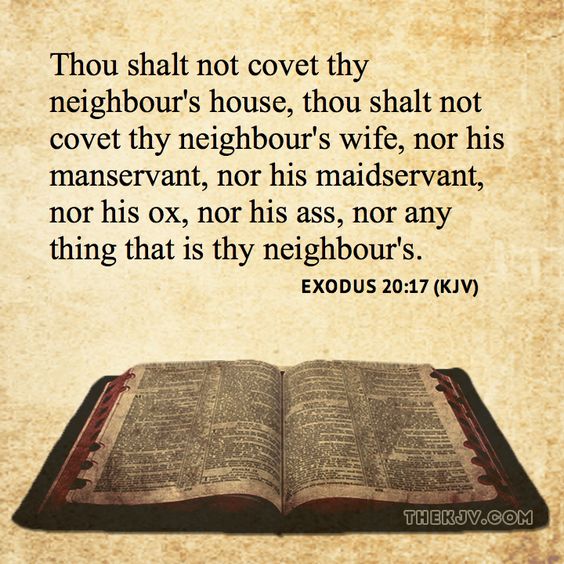Click here to return to Blog Post Intro
Does coveting even belong on the same list with idolatry, murder, theft, and adultery? After all, it is simply a “thought crime.” Coveting is a “gateway sin” which leads to many other commandment violations. In fact, it could lead to violation of any or all of the other nine commandments. Obedience to this final word serves as “preventive maintenance” for the others.
The tenth and final commandment—moving from action to thought—suggests new possibilities. It foreshadows a new law, one that will concern it less with the hands than with the heart. The Hebrew word for covet is desire, which is not sin in itself; the key distinction is that when the object is something owned by someone else, desire becomes covetousness.
One of the ways we can keep from coveting is by thanking God for what we have and acknowledging that everything is a gift from Him. Gratitude is an effective antidote (even a vaccine) against covetousness. Offer prayers of thanksgiving for the physical and spiritual gifts God has given you.
About a month from now, we’ll celebrate Thanksgiving. This will mark a great time for us to vaccinate ourselves against covetousness!
Restrain Material Desires
God wants to use our passions and desires to accomplish His good purposes. But when our desires run wild, trouble is always near. Combine our human tendency to always want more with the slick promotions of advertisers and a culture in love with material things, and it is no wonder that God warned us to be careful that we don’t covet what is not ours.
The tenth commandment’s warning (“Never let goods turn into gods”) is quite similar to the first’s (“You shall have no other gods before me”). Bottom line, we should never allow our desire for acquisition eclipse our ongoing desire to love and follow God. Ultimately, we need God’s help. That’s why one fruit of the Holy Spirit is self-control.
The Bible defines contentment as having inner sense of plenty no matter the outward circumstances. Content people can have a lot or a little and still be at peace. The bottom line is that contentment is not based on what we have, but who has us! When Jesus has our heart and the Holy Spirit leads our lives, we are content.
Coveting occurs when wanting goes beyond God’s will for our lives. When we covet, we live in an “I want more, more, more for me” state of mind. But God expects us to share generously with others, and to use the abundance he gives us to rejoice in Him and glorify Him.
The Age-Old Practice of Coveting
Coveting can strike any day, anywhere, in any relationship, with any activity. Exodus 20:17 focuses on five areas of coveting: first, a neighbor’s house, then his wife, his servant, his tools (livestock) used for his livelihood, and the general array of targets for coveting, “anything that belongs to your neighbor.”
Today, people still covet another’s “house” (more likely a neighborhood or a lifestyle) and the “ox” or “donkey”—or the tools another has for conducting business or travel (such as a particular car or motorcycle, for example).
We know that idolatry is forbidden by the Lord. It is a sin against Him and an act of unfaithfulness in one’s relationship with Him. Yet when we covet after things, we have a tendency to worship them as well, even though we probably do not bow down to them.
We must watch out for anything that increases covetousness and lessens our worship of and satisfaction in the Lord. Longing for some position or prestige can lead us to think too highly of another or even think too highly of ourselves; and these are symptoms of idolatry. Idolatry feeds one’s coveting, while coveting, in turn, increases one’s idolatry.
You may want more money to do more for the family, or to go more places, or to have more fun. Those things are not bad in and of themselves, unless they are contrary to the will of God and weaken your relationship with Him. Your career can become an idol that feeds your desire for more, while the desire for me drives the career into faster gear. It is a deadly cycle that ends in frustration and failed goals. One is never satisfied nor fulfilled, and God is grieved and displeased.
Viewing Coveting the Way God Views It

As my recent trip to Johannesburg, South Africa’s Southwest Township (Soweto) recently demonstrated, the poor will always be on the earth, in every nation, every town and all with various needs. God commanded us not to harden our hearts against a poor brother, nor withhold what one can and should give.
Proverbs 22:9 promises that the one who is “generous,” for example, in giving food to the poor, will be blessed. The word translated “generous” is literally a full Hebrew phrase translated “has a good eye.” It means to give, looking for ways to bless another, not being stingy or greedy or constantly thinking only of oneself.
The writer of Proverbs warns one not to set his eyes on a fleeting prize like wealth. One can set his eyes on it, consider how to capture it, and then spend all his energies, even wearying himself to gain it, but in the end he sees it going away, drifting farther and farther, like watching an eagle climb higher and higher father out of reach and farther out of sight.

How are you doing in this area of coveting? Do you cheat, lie, steal, or pressure others to get what you want? Do you push to get your way, to fulfill some covetous desire you have? Are you pushing for selfish satisfaction or striving for significance in some area? Desires can sometimes be overwhelming. That is why we must daily die to self and be overwhelmed by the lordship and love of Jesus Christ.
Jesus showed that one’s life doesn’t consist of possessions, but in knowing the Father and entrusting one’s life and possessions into His care. Riches come and go, but God stays with us forever. God calls us to invest in what is important to Him—taking care of others and building relationships that last forever.
Desiring to Obey the Ten Commandments
Coveting leads us to disobey every command. Consider each of the Ten Commandments and how we sometimes dishonor God with our desires:
- Do you desire another god, a different god, one who will give you what you covet to have?
- Do you desire some idol, some image of the world, some substitute for God?
- Do you desire so many wrong things that you are dishonoring God’s name with your discontentment and complaining?
- Do you desire more work time, more than the six days God has provided, to get more money or more position or more prestige? Are you failing to rest, discontent in His schedule for you?
- Do you desire parents other than the ones you have? Do you covet another home life or heritage?
- Is coveting filling you with anger? Are you coveting enough to hate someone else or even murder for what you desire?
- Are you coveting another’s spouse?
- Are you coveting someone’s else’s property or provision?
- Are you coveting and willing to lie or bear false witness against another to get what you want?
- Are all kinds of coveting a part of your life?
The next time you have a few hours to spare and you’re tempted to do a little recreational shopping, make a choice of courage. Rather than acquire more stuff, invest in something that will lead to a richer life without filling up your closet or garage. If you want to take this idea a step further, give the money you would have spent at the shopping center to a ministry or someone in need…


